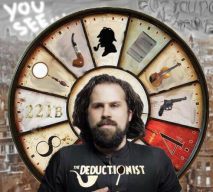
So, you have completed a few months of training and understand a large part of the foundations of what it takes to read a person and\or a scene. What next? Do you wait for the data to be presented to you or do you derive meaning only on sight? What happens if there is nothing there? How do you know what it means within the context of everything else?
One simple word, and yet it encompasses a lot of detail – Baseline.
`Never trust general impressions my boy but concentrate yourself upon details`
Sherlock Holmes – A Case of Identity
So what this would intimate is the study of the person or scenario at rest in order to compare this to what you are seeing at that moment. If you are to decipher if an arms crossed gesture is evasive, blocking, anxious or simply a response to temperature/illness then you must examine the displays when the person has no rhyme or reason to have an influx of emotional action.
Let’s create a hypothetical scenario in which to illustrate the point. If you want to talk to someone about what they do for a living and look to understand the ins and outs of their day because their job is interesting or classified you need to have a grounding in what they are like when they are at the Supermarket or filling in forms, ordering a drink at the bar or having a conversation with someone at a bus stop. We start to observe these displays, do we see any arms crossed behaviours? How do they relate to the context? Is it warm or hot? Are the bored, do they have a stomach ache?
So that when and if we see this during a heightened scenario we can be aware of its pertinence or not. The same can be said of a scene or location. If we know someone has had an argument or a fight somewhere, how do we know this has occurred without knowing what the room was like when nobody was there or what it is normally like on a average day to day basis? We cant if we don’t have a baseline to work with, to compare and contrast so to speak. If we see them cross their arms when we talk about their latest project and/or business relocation, we would be aware of its relevance ad meaning once we have compared this to our baseline.
Think of any time you have ever walked into somewhere and had the immediate sentiment that something had happened? Known your work friend was hungover and not actually sick? Thought that your partner was lying to you about where they were. Been curious if someone doesn’t like what you have cooked for them. Why do you think this?
You are comparing your knowledge that you have already built up about the people you have these relationships with in order to discern what their felt state is at that time. You are baselining them. It’s no different to when you do this with subjects or scenes that you are not that familiar with, you would just need to gain your information foundation.
In this sense it is a lot like a flatline heart monitor. The only signs of life that you will see is the pulse as it comes back – the deviations from the norm.
Don’t forget to check out my 1 on 1 coaching sessions pages to book in your slot for a more in-depth tutorial in how to use the Sherlockian approach to aid you in your day to day lives. Click here
To explore what life would be like through the eyes of Sherlock Holmes, get yours here. MX Publishing Link to get your own copy!
So here we understand that the eyes can be so much more than the windows to the soul.
Do stay in touch.
Ben
